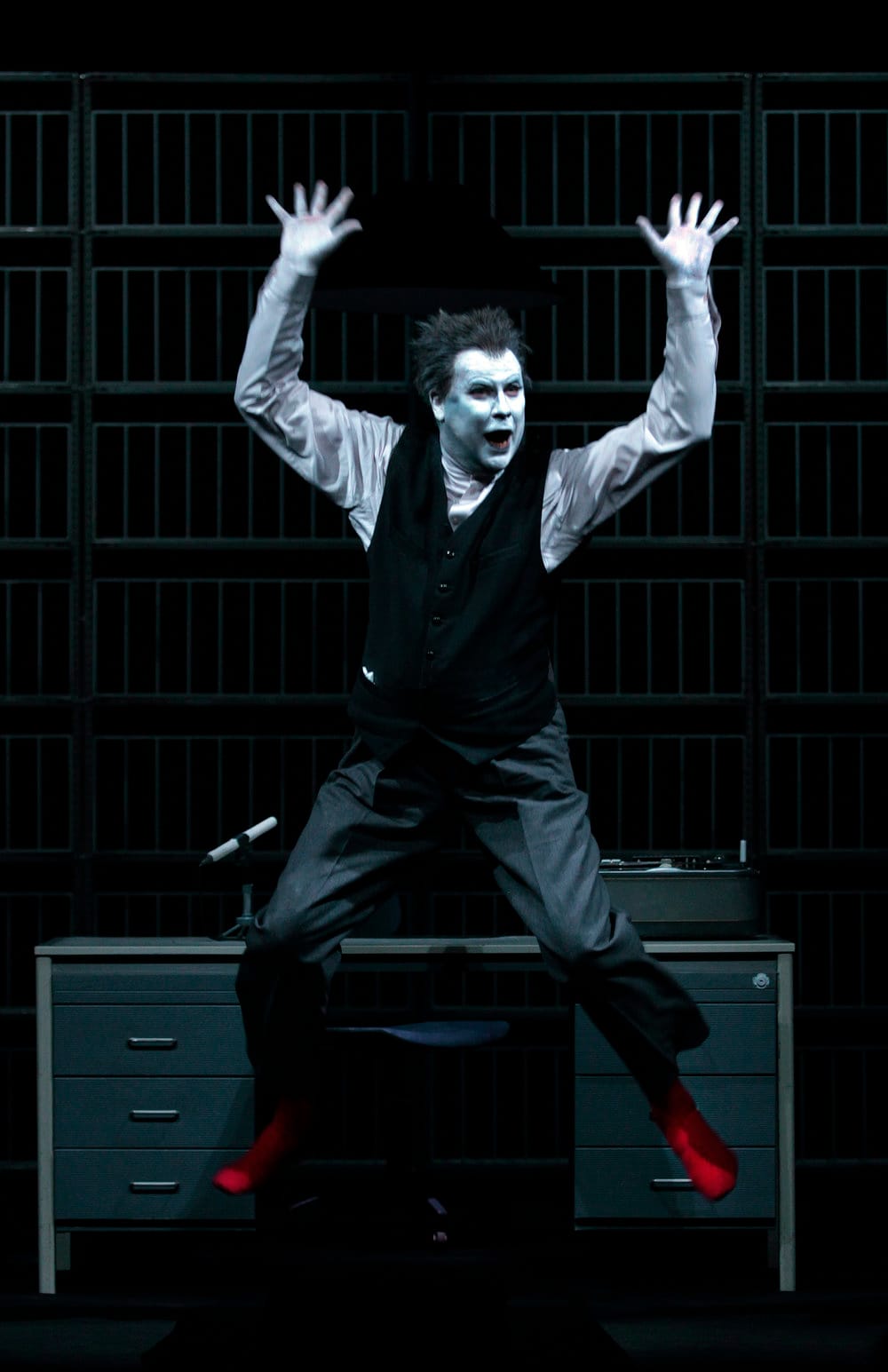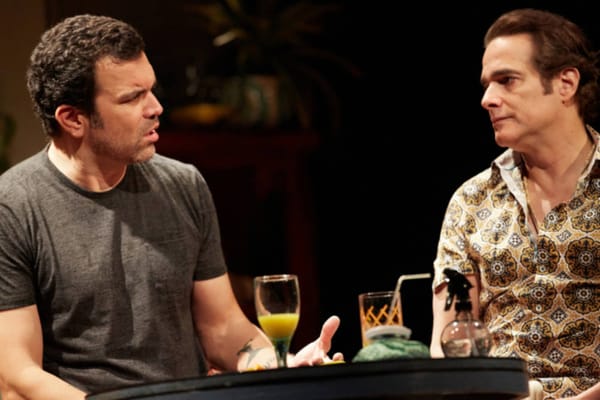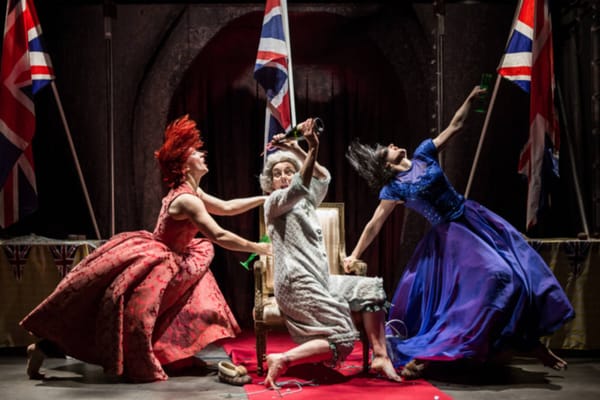Krapp's Last Tape: A Clownish Take on a Classic
Fred Fyles finds that Robert Wilson disappoints in this production, which ignores the beauty of Beckett's language

As the Barbican Centre’s month-long celebration of Samuel Beckett comes to an end, what better production can see us out than Krapp’s Last Tape, a tale of a man looking back on the past, evaluating his actions? There is a palpable sense of excitement in the Barbican Theatre, as famed director Robert Wilson is taking on the role, but from the offset, it is clear that things are going to be different with this version.
Firstly, Wilson’s Krapp is a far cry from the traditional idea of the character, as embodied by the original actor, Patrick Magee, or by John Hurt, whose version recently received critical acclaim in America. Their Krapps are destitute men, clothed - as dictated by Beckett - in ‘rusty black narrow trousers’ and ‘grimey white shirts’. Wilson keeps the clothing directions - with a flash of bright red sock the only concession to the colour spectrum - but cakes his face with white greasepaint, and powders his hair white, looking more like the long-dead spirit of a French mime than a weary, old man. Wilson’s Krapp is a kabuki Charlie Chaplin, each motion perfectly calculated as a form of physical theatre. Nowhere is this more apparent than in the first section of the play, where Wilson, accompanied to the sound of a torrential downpour, slowly, agonisingly slowly, peels and eats two bananas, his face crumpling in upon itself, like the mere effort of chewing is physically painful. It is during this time, too, that we can take the time to admire the ample stagecraft that has gone into the production: clearly Wilson is a master director when it comes to creating a physical space. Using the stage as a blank canvas, he has created an austere, spartan cell of a setting, whose harsh lighting and angular furniture only reinforce the challenging nature of the production.
Once Krapp begins the monologue, things begin to go awry for the production
However, once this section passes, when the downpour stops, and Krapp begins his monologue, things begin to go awry for the production. Beckett’s work is meant to be challenging, but it should be possible to find a sense of joy in the difficulty: the predicament of Estragon and Vladimir; Winnie’s encasement within sand in Happy Days; Nagg and Nell’s dustbin abodes in Endgame - these are all harrowing scenes, but there is something recognisably human contained within. Wilson’s direction has sucked the life out of Beckett, creating an environment which is harsh, cold, and - ultimately - unwelcoming.
Krapp’s Last Tape, although meant for a single actor, is not a monologue. The majority of the speaking is done by the disembodied voice of a Krapp 30 years past, and the piece is a one-way conversation: the Krapp on tape laments the folly of his youth, while the Krapp on stage scoffs at his younger counterpart’s visions of the future. Something about Wilson’s delivery manages to miss this, to overlook the heartbreaking idea central to the plot, that youth cannot be captured, and that we are all falling headlong into the grave from the minute we are born. Maybe it’s Wilson’s broad accent; or maybe it was his tendency to keep interrupting the recording; or maybe I’m just going slowly deaf, plunging rapidly into decrepitude; but for most of the performance I was unable to really understand the language of the performance, meaning I cared little about the play.
Within Beckett’s work there is an immense physicality, centred around the dichotomy between ability and disability: just look at Endgame, for example, whose central characters are Hamm, unable to stand, and Clov, unable to sit. Therefore, it should make sense for Wilson to take on the role of Krapp; best known for works like Einstein on the Beach, Wilson has a strong reputation for physical theatre, and on this aspect of the performance he delivers. However, Beckett’s pieces are not simply about the nature of the body; they also have some of the most poetic lines in modern drama, and an obsession with the nature of language. To perform Beckett, one must have an appreciation of both aspects, and sadly Wilson’s performance completely seems to disregard the language, leaving us only with a clownish performance; a braying fool, with nothing to say.
Wilson leaves us only with a clownish performance; a braying fool, with nothing to say.
At the end of the performance, Wilson came out to gurn and caper at the applauding audience; however, not everyone was impressed, and one member made his displeasure known, booing loudly from the back of the auditorium. As the house lights went up, a man in the front row called out ‘to the person who booed: you’re a fucking idiot’, to a further round of cheering from the audience. While such a divided reaction is refreshing, one needs to be careful to avoid groupthink when judging a performance; the man who booed was certainly not alone, although perhaps not all would be so vocal - I distinctly heard the person behind me repeatedly use the word ‘awful’ as Wilson took his bow. To have a differing view from those who forked out for front-row seats, to refuse to fall prostrate at the feet of a venerated figure of theatre regardless of his performance, to refuse to drink the kool-aid - these are all just aspects of being human, of having opinions, of thinking critically. But then I’m sure that to the man at the front I am just another ‘fucking idiot’. So be it.
Krapp’s Last Tape is on at the Barbican Centre until 21st June. Tickets from £16; available online.





